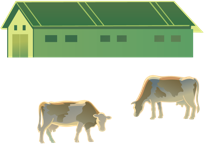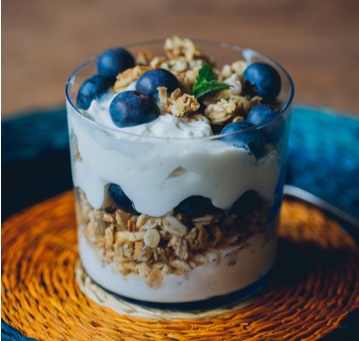Dairy products are delicious and whether you’re cooking up a fancy hollandaise sauce on your range cooker or simply enjoying your morning cereal with milk it’s reassuring to know it’s from a sustainable, ethical source.
There are a lot of questions to ask when picking out dairy products; how far has this milk travelled? How was this yoghurt made? To find out more about sourcing sustainable dairy products we’ve spoken to The Dorset Dairy Co. Below you’ll find all you need to know to ensure you’re making smart, ethical choices when picking up your next pint of milk.
As consumers, how can we make sure the dairy products we are buying are good quality and from a sustainable source?

© The Dorset Dairy Co
The Dorset Dairy Co is a third-generation, family run dairy producing high-quality milk and yoghurt. Using traditional crop rotation techniques to provide food for their herd during the winter, The Dorset Dairy Co has a strong focus on sustainability and puts the welfare of their animals first.

The best way to find a sustainable source is to buy from a local dairy processor. Buying local is number one, firstly because milk is a perishable product and has a very short shelf life. And secondly, because milk that has been transported long distances has a much higher carbon footprint. Buying close to home also really helps your local economy.
Only if you buy at a farmers’ market, from a farm shop or buy a local brand in a larger retailer do you know that the milk has come from a particular source – and the good news is that there are plenty of these smaller dairy companies around!
We eat dairy products not only because they taste good but also because they are very nutritious. Milk, cheese and natural yoghurt are all high in quality protein, calcium, and lots of other vital minerals. Most cheeses and yoghurts also have live bacteria that can have important benefits to gut health.

© The Dorset Dairy Co
For dairy farms to be profitable they need to have healthy cows. It’s not easy to over milk a cow but doing so would not be in the farming business’s best interest. Under milking cows could be of a larger animal welfare issue, this could lead to mastitis and physically damaged udders.

Almost all dairy companies now ensure that their supplying farmers are looking after their livestock to a high standard – each dairy has its own set of criteria that their farms get assessed on. It’s reassuring to know that the global dairy industry in the UK has the highest standards going. Technology has helped make this improvement and monitoring possible.
Are there any labels to look out for when buying dairy products?
There are a few labels used on milk and other dairy products that we can look for to make sure we are buying dairy from a sustainable source.

Soil Association Organic Standard logo: This logo means animals have been raised with a high level of animal welfare, and also takes wildlife conservation into account.

RSPCA Assured logo (formerly Freedom Food): This ensures the animals welfare throughout the food production process, not only how the animals are raised and treated on the farm.
Different supermarkets also use their own labels, but these should all be clear and informative and if you’re not sure about a label, ask.



There isn’t enough convincing evidence that dairy alternatives would be more sustainable than cow’s milk when you compare the nutritional yield (the amount of available complete protein, fat and essential nutrients) versus the resource inputs when harvested from the same amount of land area, with the same amount of water, energy and nutrients put in.
Around 95% of cow feed in the UK is from sustainable sources. Cows fed a high proportion of forage are healthier, produce a better quality of milk and when it’s done right is also a lot cheaper than when bought in ‘concentrates’.

It’s unfair to compare litre for litre or gram for gram of dairy versus alternatives as the nutritional content of an animal-based product is generally always a lot higher in protein and micronutrients.
The dairy industry has worked hard to move towards more sustainable practices. In 2018 a report was released that shows the industry has made significant leaps towards their sustainability goals :
24% improvement in water efficiency

18% improvement in energy efficiency

24% reduction in greenhouse gas emissions

Buying from a local producer that cares about the environment they live in would be the best way to guarantee you’re eating a sustainable product.
Each dairy alternative company has their own policy on the sourcing of their ingredients and not many, if any, will be grown in the UK which makes it hard to trace the source.
Vegan yoghurt lacks the nutrition - especially protein and essential vitamins and minerals - of cow’s milk yoghurt. Coconut yoghurt, for example, has on average 1.2 grams of protein per 100g. For active adults and growing children, this isn’t going to help meet their nutritional requirements as well as dairy-based yoghurts can with on average 8.5g of protein per 100 grams.

© The Dorset Dairy Co
How can people get more advice?
- Go to your local farmers market and speak to the farmers.
- Follow the farms and companies on social media to get an insight into their farming practices.
- Read farming publications like the Farmer’s Weekly and specialist dairying magazines to gain a better understanding of what UK dairy farms are doing to improve their industry.